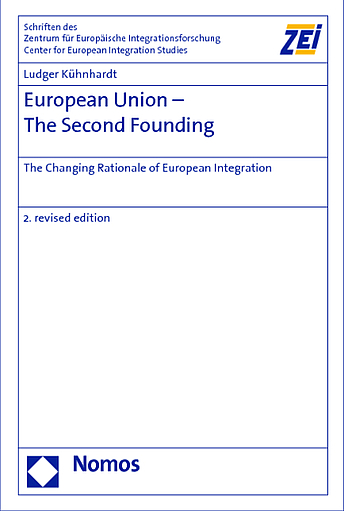englischProf. Dr. Ludger Kühnhardt, Director at the renowned Center for European Integration Studies (ZEI) at the University of Bonn is presenting a broadly structured study about the first fifty years of European integration, its geopolitical context and academic reflection. His study is based on the two-fold thesis that since a few years, the European Union is going through a process of its Second Founding while simultaneously changing its rationale. The original founding of European integration in 1957 was based on the notion of internal reconciliation among European states and societies. Since the 1990s European integration has become, increasingly, a political project with implications for the internal structure of its member states and their societies. At the same time, with the end of the Cold War, the rational of European integration has begun to change: European integration is about a new global role of Europe, its contribution to the management of global affairs and its ability to cope with the effects of globalization on Europe. Inside the EU, the Second Founding is about a new contract between political elites and the people of Europe in order to solidify legitimacy and effectiveness for this unique experiment in European history.
The revised second edition of this book takes into account the ratification of the Treaty of Lisbon that has come into effect on December 1, 2009, as well as the debate over European economic governance in light of the Greek state deficit.
Der Autor legt eine breit angelegte Studie über den bisherigen fünfzigjährigen Entwicklungsprozess der europäischen Integration und seine weltpolitischen und wissenschaftstheoretischen Zusammenhänge vor.
Die Studie geht von der zweifachen These aus, dass sich die EU seit einigen Jahren einer zweiten Gründung unterzieht und sich dabei zugleich die Begründung für die europäische Integration wandelt. Nach der ersten Gründung 1957 erfolgt seit Ende der achtziger/Anfang der neunziger Jahre eine stärkere Politisierung der Integration, verbunden mit gesteigertem Interesse der europäischen Bürger (aber auch stärkerer Kritik) an der Integration.
Zugleich wandelt sich seit dem Ende des Kalten Krieges und der Überwindung der Teilung Europas die Begründung: War die europäische Integration in den ersten Jahrzehnten vorrangig eine Angelegenheit der inneren Aussöhnung unter den Staaten und Völkern Europas, so richtet sie sich seit einigen Jahren immer deutlicher aus an der Suche nach einer neuen globalen Rolle Europas im Zeitalter der Globalisierung und des Managements globaler Fragestellungen.
Die Studie ist ein grundlegender Beitrag zur Standortbestimmung der Europäischen Union am Ende einer besonders krisenhaften Phase ihrer Entwicklung.


